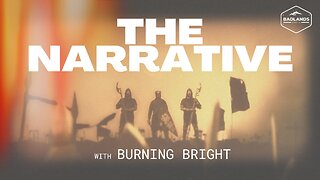Premium Only Content

Brave New World (2013) Aldous Huxley
Brave New World is a dystopian novel by English author Aldous Huxley, written in 1931 and published in 1932.
Largely set in a futuristic World State, whose citizens are environmentally engineered into an intelligence-based social hierarchy, the novel anticipates huge scientific advancements in reproductive technology, sleep-learning, psychological manipulation and classical conditioning that are combined to make a dystopian society which is challenged by the story's protagonist.
Huxley followed this book with a reassessment in essay form, Brave New World Revisited (1958), and with his final novel, Island (1962), the utopian counterpart. This novel is often compared to George Orwell's 1984 (1949).
In 1999, the Modern Library ranked Brave New World at number 5 on its list of the 100 best English-language novels of the 20th century. In 2003, Robert McCrum, writing for The Observer, included Brave New World chronologically at number 53 in "the top 100 greatest novels of all time", and the novel was listed at number 87 on The Big Read survey by the BBC.[5] Brave New World has frequently been banned and challenged since its original publication.
It has landed on the American Library Association list of top 100 banned and challenged books of the decade since the association began the list in 1990.
Title
The title Brave New World derives from Miranda's speech in William Shakespeare's The Tempest, Act V, Scene I:
O wonder!
How many goodly creatures are there here!
How beauteous mankind is! O brave new world,
That has such people in't.
— William Shakespeare, The Tempest, Act V, Scene I, ll. 203–206
Shakespeare's use of the phrase is intended ironically, as the speaker is failing to recognize the evil nature of the island's visitors because of her innocence. Indeed, the next speaker—Miranda's father Prospero—replies to her innocent observation with the statement "'Tis new to thee."
Translations of the title often allude to similar expressions used in domestic works of literature: the French edition of the work is entitled Le Meilleur des mondes (The Best of All Worlds), an allusion to an expression used by the philosopher Gottfried Leibniz and satirized in Candide, Ou l'Optimisme by Voltaire (1759). The first Standard Chinese translation, done by novelist Lily Hsueh and Aaron Jen-wang Hsueh in 1974, is entitled "美麗新世界" (Pinyin: Měilì Xīn Shìjiè, literally "Beautiful New World").
Brave New World (radio broadcast) BBC Radio 4 (May 2013)
-
 1:27:44
1:27:44
Game On!
18 hours ago $5.02 earnedWe have a MASTERS CHAMPION!
19.4K2 -
 12:27
12:27
Tactical Considerations
15 hours ago $3.62 earnedTop 3 Striker Fired Pistols That DOMINATE The Range in 2025
29.4K3 -
 25:35
25:35
JasminLaine
16 hours agoLiberals CAUGHT Planting Evidence to Frame Poilievre—CBC Host Gets FACT-CHECKED Into Oblivion
18.7K44 -
 1:37:56
1:37:56
TheDozenPodcast
21 hours agoWhy Capital PUNISHMENT needs restoring: Ex Detective exposes Child Protection Unit
26.9K4 -
 2:02:22
2:02:22
BEK TV
2 days agoTrent Loos in the Morning 4/14/2025
18.4K2 -
 20:18
20:18
DeVory Darkins
17 hours ago $23.99 earnedTrump SMACKS DOWN media as Democrats cry for Pete Hegseth to be Fired
71.7K148 -
 3:11:18
3:11:18
Badlands Media
1 day agoThe Narrative Ep. 18: Leaders of the Golden Age
148K46 -
 28:03
28:03
Adam Carolla
16 hours ago $13.20 earnedFraud, Corruption & Minecraft Mayhem - Gen Z's new Cult Classic | The Adam Carolla Show | #news
97.6K32 -
 2:37:08
2:37:08
TheSaltyCracker
14 hours agoTrump is The People's Champ ReeEEeE Stream 04-13-25
223K291 -
 4:24:35
4:24:35
Due Dissidence
23 hours agoDave Smith and Douglas Murray THROW DOWN, Judge OK's Khalil Removal, Maher Dishes on Trump Summit
85.8K87